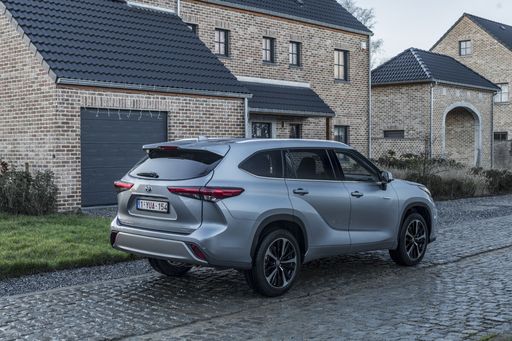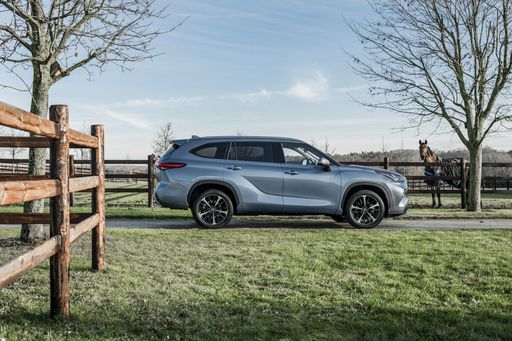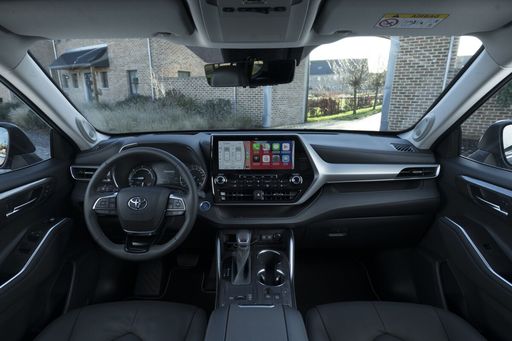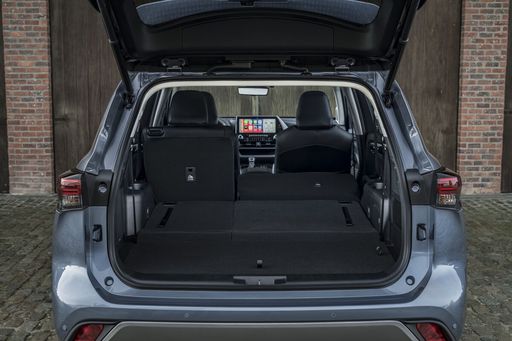Nissan Leaf VS Toyota Highlander – Specs, Efficiency & Price Comparison
Which model is the better choice – the Nissan Leaf or the Toyota Highlander? We compare performance (217 HP vs ), boot capacity (394 L vs ), efficiency (16.70 kWh vs ), and of course, the price (30800 £ vs ).
Find out now which car fits your needs better!
The Nissan Leaf (Hatchback) is powered by a Electric engine and comes with a Automatic transmission. In comparison, the Toyota Highlander () features a engine and a gearbox.
When it comes to boot capacity, the Nissan Leaf offers 394 L, while the Toyota Highlander provides – depending on what matters most to you. If you’re looking for more power, you’ll need to decide whether the 217 HP of the Nissan Leaf or the of the Toyota Highlander suits your needs better.
There are also differences in efficiency: 16.70 kWh vs . In terms of price, the Nissan Leaf starts at 30800 £, while the Toyota Highlander is available from .
Compare all the key specs now and find out which model fits your lifestyle best!
Nissan Leaf
The Nissan Leaf stands out as a pioneering model in the realm of electric vehicles, known for its impressive blend of practicality and eco-friendliness. It offers a smooth and quiet driving experience, making it an ideal choice for city commuting and longer journeys alike. The interior design is both comfortable and intuitive, providing drivers with a sense of modernity and ease of use.
details @ germany.nissannews.com
@ germany.nissannews.com
 @ germany.nissannews.com
@ germany.nissannews.com
 @ germany.nissannews.com
@ germany.nissannews.com
 @ germany.nissannews.com
@ germany.nissannews.com
Toyota Highlander
The Toyota Highlander is a versatile SUV that seamlessly blends comfort and practicality, making it an ideal choice for families and adventurers alike. With its spacious interior and a clever layout, it offers ample room for passengers and luggage, ensuring every journey is a comfortable experience. Its sophisticated design is complemented by advanced technology features, enhancing both connectivity and safety on the road.
details @ Toyota
@ Toyota
 @ Toyota
@ Toyota
 @ Toyota
@ Toyota
 @ Toyota
@ Toyota
 @ Toyota
@ Toyota

|

|
|
|
|
Costs and Consumption |
|
|---|---|
|
Price
30800 - 37200 £
|
Price
-
|
|
Consumption L/100km
-
|
Consumption L/100km
-
|
|
Consumption kWh/100km
16.7 - 17.8 kWh
|
Consumption kWh/100km
-
|
|
Electric Range
270 - 385 km
|
Electric Range
-
|
|
Battery Capacity
39 - 59 kWh
|
Battery Capacity
-
|
|
co2
0 g/km
|
co2
-
|
|
Fuel tank capacity
-
|
Fuel tank capacity
-
|
Dimensions and Body |
|
|---|---|
|
Body Type
Hatchback
|
Body Type
-
|
|
Seats
5
|
Seats
-
|
|
Doors
5
|
Doors
-
|
|
Curb weight
1580 - 1756 kg
|
Curb weight
-
|
|
Trunk capacity
385 - 394 L
|
Trunk capacity
-
|
|
Length
4490 mm
|
Length
-
|
|
Width
1788 mm
|
Width
-
|
|
Height
1540 - 1545 mm
|
Height
-
|
|
Payload
384 - 415 kg
|
Payload
-
|
Engine and Performance |
|
|---|---|
|
Engine Type
Electric
|
Engine Type
-
|
|
Transmission
Automatic
|
Transmission
-
|
|
Transmission Detail
Reduction Gearbox
|
Transmission Detail
-
|
|
Drive Type
Front-Wheel Drive
|
Drive Type
-
|
|
Power HP
150 - 217 HP
|
Power HP
-
|
|
Acceleration 0-100km/h
6.9 - 7.9 s
|
Acceleration 0-100km/h
-
|
|
Max Speed
144 - 157 km/h
|
Max Speed
-
|
|
Torque
320 - 340 Nm
|
Torque
-
|
|
Number of Cylinders
-
|
Number of Cylinders
-
|
|
Power kW
110 - 160 kW
|
Power kW
-
|
|
Engine capacity
-
|
Engine capacity
-
|
General |
|
|---|---|
|
Model Year
2019
|
Model Year
-
|
|
CO2 Efficiency Class
A
|
CO2 Efficiency Class
-
|
|
Brand
Nissan
|
Brand
-
|
Nissan Leaf
Introduction to the Nissan Leaf: A Pioneer in Electric Mobility
The Nissan Leaf has established itself as a trailblazer in the realm of electric vehicles (EVs) since its launch. As we delve into its present-day iterations, the Leaf continues to soar in popularity due to remarkable advancements in technology and sustainability. Let's explore what makes the Nissan Leaf a standout in today's automotive market.
Power and Performance: Under the Hood of the Nissan Leaf
The Nissan Leaf boasts a power output ranging from 150 to 217 PS, depending on the battery option chosen. The vehicle's electric motor, a product of cutting-edge engineering, offers instant torque ranging from 320 to 340 Nm, resulting in impressive acceleration capabilities. The 0 to 100 km/h dash is achieved in as little as 6.9 seconds, showcasing its prowess in electric performance.
Battery Technology: Efficient Energy Management
When discussing the Nissan Leaf, battery technology is at the forefront. The available battery capacities range from 39 to 59 kWh, supporting an electric range between 270 to 385 km. This flexibility allows drivers to choose a model that best fits their driving habits, providing peace of mind for longer journeys without frequent recharging.
Sustainability: The Environmental Edge
One of the primary attractions of the Nissan Leaf is its commitment to sustainability. As an all-electric vehicle, it produces zero CO2 emissions, placing it in the top tier of the CO2-efficiency class with an 'A' rating. This clean energy approach contributes significantly to reducing environmental impact and supports Nissan's drive towards a greener future.
Design and Comfort: Aesthetic Appeal and Practicality
The Nissan Leaf is not just about efficiency; it's also designed for comfort and utility. With its sleek hatchback body and dimensions of 4490 mm in length, 1788 mm in width, and a height of up to 1545 mm, it offers ample interior space. The boot capacity ranges from 385 to 394 litres, providing sufficient storage for everyday needs. The model accommodates five passengers comfortably, ensuring a pleasant ride for everyone.
Innovations and Safety: Advanced Features for Peace of Mind
Nissan equips the Leaf with an array of intelligent features that enhance safety and convenience. The available equipment lines, including N-CONNECTA, Tekna, e+ N-CONNECTA, and e+ Tekna, offer varying levels of technology integration. ProPILOT Assist, e-Pedal, and a comprehensive suite of driver-assistance technology are just a few examples that highlight Nissan's commitment to innovation in the EV market.
Conclusion: The Nissan Leaf Continues to Lead
With prices ranging from €35,900 to €43,400, the Nissan Leaf remains an attractive choice for those looking to embrace electric mobility. It perfectly balances performance, design, and sustainability, making it a compelling choice in the competitive EV landscape. The Nissan Leaf not only represents the future of driving but also reinforces why it continues to be a leader in the electric vehicle community.
Toyota Highlander
Meet the Toyota Highlander: A Synergy of Power and Efficiency
The Toyota Highlander stands as a testament to modern automotive engineering, blending robust design with state-of-the-art hybrid technology. Designed for families seeking both luxury and practicality, this SUV is more than just a means of transportation—it is an innovative solution to contemporary demands.
Stellar Performance and Hybrid Technology
Under the bonnet of the Highlander lies a full-hybrid powertrain that marries efficiency with performance. Producing an impressive 248 PS, the Highlander doesn't just promise power but delivers it with a refined acceleration from 0 to 100 km/h in just 8.3 seconds. Such performance is coupled with a frugal fuel consumption rate ranging between 6.6 and 7.1 L/100km, setting a benchmark for hybrid SUVs in its class.
A Dynamic Driving Experience
Fitted with a Continuously Variable Transmission (CVT), the Highlander ensures a smooth and responsive driving experience. The all-wheel-drive system enhances safety and control, providing confidence across various driving conditions. With a maximum speed of 180 km/h, this SUV is crafted to perform on both city streets and open highways.
Precision Engineering and Eco-Conscious Design
The Highlander boasts a four-cylinder engine with a displacement of 2487 cm³, perfectly balancing power and environmental considerations. Despite its robust performance, the vehicle remains eco-conscious, adhering to CO2 emissions ranging from 149 to 160 g/km, classified under the CO2 efficiency classes E and F.
Space and Luxury Redefined
Designed with practicality in mind, the Highlander seats seven comfortably, making it an ideal choice for family adventures. Its 241-litre boot capacity, expandable with rear seats folded, ensures storage space is never a concern. From its elegant body design measuring 4966 mm in length to its expansive width of 1930 mm, the Highlander exudes both strength and elegance.
Unmatched Safety and Features
Incorporated within the Highlander are safety features and innovative technologies that enhance every drive. Depending on the trim level—Business Edition, Executive, or Luxury—drivers are offered an array of amenities designed to improve comfort and security.
Cost-Effective Ownership
Though packed with features, the Highlander remains cost-effective. Monthly costs range from €1428 to €1606, with per kilometre expenses of 57.2 to 64.3 cents. This financial feasibility, combined with enduring quality, makes the Highlander a worthwhile investment for conscientious consumers.
Conclusion
The Toyota Highlander transcends the typical expectations of an SUV, providing an exceptional blend of power, space, and technology. Whether navigating urban landscapes or embarking on rural escapes, it promises to deliver with unparalleled versatility and comfort.
The prices and data displayed are estimates based on German list prices and may vary by country. This information is not legally binding.
